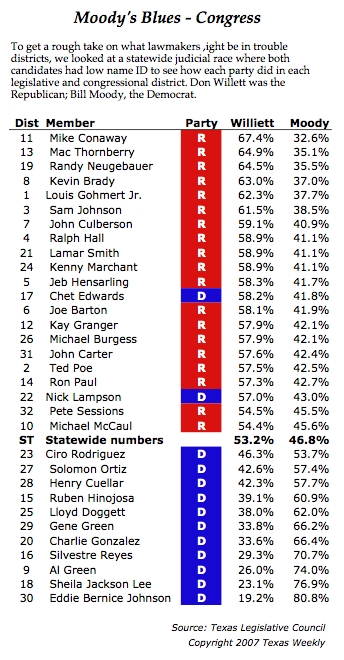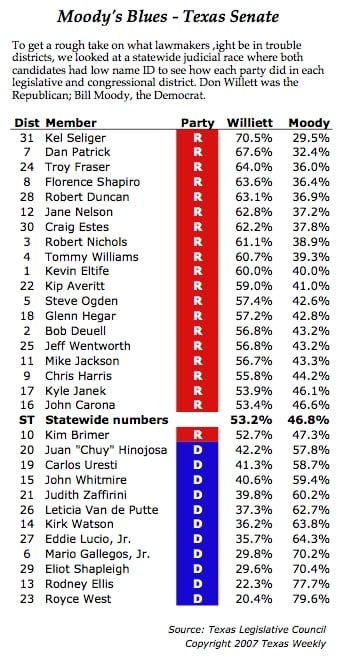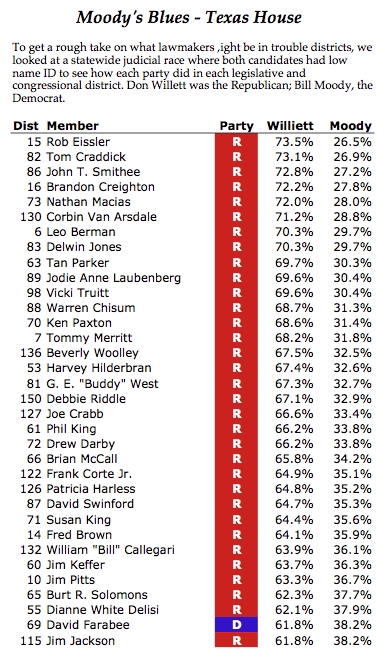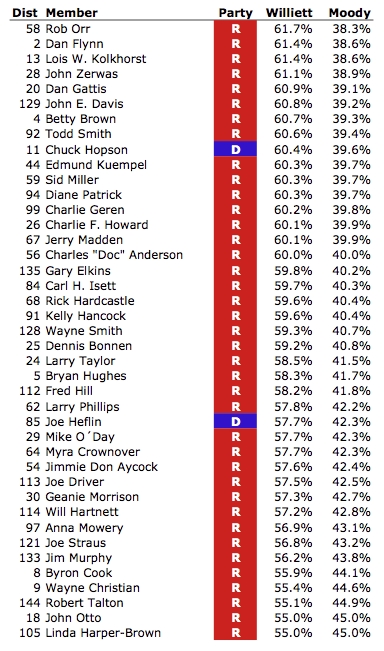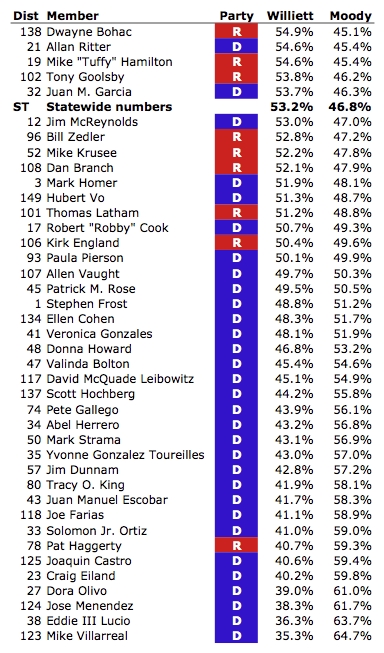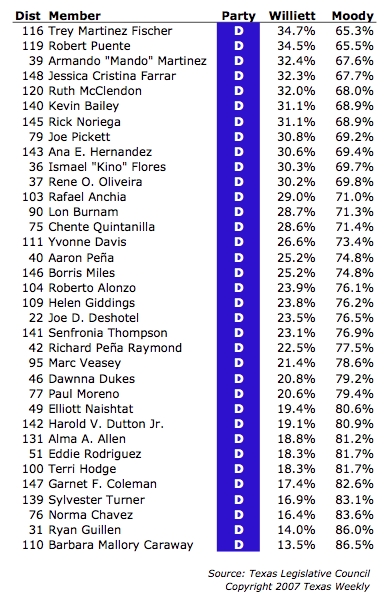Just as state officeholders were racing to stock their election accounts by an end-of-month deadline, the state and federal courts got busy on the subject of campaign finance. The state's highest criminal court had good news for former U.S. House Majority Leader Tom DeLay, while the nation's highest court had good news for corporations and unions and groups that campaign on so-called issue ads in the last week's before elections.
We'll start with the locals. Some of the indictments ofDeLay and two codefendants should be dropped, according to the Texas Court of Criminal Appeals. Travis County District Attorney Ronnie Earle, whose office obtained the indictments, plans to ask the court to rehear the issue.
The state's highest criminal court agreed, narrowly, with lower courts, saying some of the indictments against DeLay, Jim Ellis, and John Colyandro should be dropped. Those indictments allege conspiracy to break a law that wasn't in the state penal code at the time. Four of the nine judges on the court dissented, saying they didn't see the sense in saying conspiracy applies to some felonies and not to others. Judge Tom Price voted with the majority, but said the dissenters have a point and suggested he might side with them on a future case that makes the same points.
Earle plans to ask for a rehearing, saying the ruling isn't logical: "Criminal conspiracy means three things. It means a person intends to commit a felony. It means that the person agrees that he or his co-conspirators will engage in conduct that would constitute the crime. And it means one of them performs some act in pursuit of the crime. Under the rationale of today’s majority opinion, the Legislature has blessed these criminal conspiracies as long as the felony they agree to commit is not in the Penal Code."
DeLay commented on the case in his blog, comparing Earle to the prosecutor who wrongly went after Duke University's lacrosse players: "The Texas Court of Criminal Appeals today ruled that I was wrongfully indicted by Ronnie Earle, the Mike Nifong of Texas, on laws that didn't even exist... [His] politically motivated indictments cost Republicans the leader of their choice, and my family hundreds of thousands of dollars in legal fees... [He] may think this case is about campaign finance, but in the end it will be a case about his own prosecutorial misconduct."
If the conspiracy charges fall, all three remain indicted on money laundering charges; Ellis and Colyandro face separate indictments on charges they made illegal campaign contributions. And once the Court of Criminal Appeals is done, the case will go back to the trial judge, Pat Priest, for the next round.
Rulings (there are several indictments against each of the three men, but the decisions roll all eight indictments into one package) are at these links: Judge Michael Keasler, opinion; Presiding Judge Sharon Keller, concurring; Judge Tom Price, concurring; Judge Cathy Cochran, dissenting.
One for the Money
One of the big arguments after the 2002 elections — sometimes in the center of the table and sometimes on the side — was about the corporate money behind efforts to put a Republican majority in the Texas House.
The U.S. Supreme Court's latest campaign finance ruling wasn't about the Texas election, or about the Texas law, exactly. But it's the latest snapshot of where the federal courts think campaign limits end and free speech begins, and it'll reverberate in elections here.
Corporate and union money can't be used to promote candidates (though political action committees affiliated in legally defined ways can), and some Democrats felt the Republicans stepped over the lines in the 2002 Texas races. The Republicans, you'll remember, figured they were on safe ground with ads that never used "magic words" urging people to vote for or against a particular candidate. In their reading, it's okay to say — in an ad purchased with corporate or union donations — that Joe Schmo voted for a foolish and unpopular thing or is against a smart, popular thing. And it's okay to do that in the days before an election, just so long as you don't tell people whether they should pull the lever for Mr. Schmo or for his opponent.
The use of corporate money for ads like that is the basis of some of the charges against former U.S. Rep. Tom DeLay, R-Sugar Land, and two former associates.
Again, state and federal campaign laws differ. But state laws often chase federal definitions and legal opinions; the "magic words" bit, for instance, comes from a footnote in a landmark federal case. And if the McCain Feingold limits on campaign finance are unconstitutional, then so are state laws that resemble them.
The federal law put another restriction on things, curtailing use of those "educational" or "issue" ads in the final weeks of campaigns. Now the Supremes say that's an unconstitutional restriction of free speech. If the ads are clearly advocating election of a particular candidate — or the defeat of one — they're still barred. But if there's any other "reasonable interpretation," the justices say the ads can run. The ads in question were run by Wisconsin Right to Life, criticizing U.S. Sen. Russ Feingold's opposition to the president's judicial appointees. They ran in the weeks before his reelection campaign — during a 30-day blackout period described in the law — and urged viewers to contact him. They didn't say how people should vote. The court said, in effect, that the group had the First Amendment right to run the ads.
How's it play back here? Ask a lawyer. But the Democrats were agitated about mailers from the Texas Association of Business, in particular, that blasted various Democrats and extolled the virtues of Republican challengers back in 2002. Some of that battle is still alive in Texas courts, and the Wisconsin Right to Life case hits on some of the same issues.
Moody Blues
To get a rough take on what lawmakers might be in "trouble districts," we looked at a statewide judicial race where both candidates had low name ID to see how each party did in each legislative and congressional district. Don Willett was the Republican; Bill Moody, the Democrat. We put them in a separate spot on the website so the newsletter wouldn't print 10 pages long; see them online here, or download a copy.
Road Warriors
The North Texas Tollway Authority — alias, the NTTA — beat a private sector conglomerate on expansion of State Highway 121 in Dallas-Fort Worth.
The state's Transportation Commission voted 4-1 to go with the recommendation of a local transportation board that sided with NTTA. That won kudos from two state senators who've been watching carefully (Transportation Committee Chairman John Carona, R-Dallas, and former transportation commissioner Robert Nichols, R-Jacksonville). And it came on the heels of a letter from Lt. Gov. David Dewhurst urging the commissioners to abide by the earlier local decision in NTTA's favor.
The losing consortium didn't concede, issuing a statement after the meeting saying the NTTA proposal is "incomplete and lacks a firm financial commitment." Cintra/JPMorgan say they can do the project faster and with less financial risk. The commission's vote lets highway officials negotiate a final deal with NTTA. If that falls through, those officials could go with the Cintra deal or make other plans.
Cintra had an inside track on the road at one time, but lawmakers wanted to see if the local transportation folks could compete with the private sector, and reopened the bidding.
Pre-Season Politics
Freshman state Rep. Thomas Latham, a Sunnyvale Republican and a former cop, has trouble at home — with his own ilk. The Mesquite Police Association is calling him "an embarrassment to the badge" and withdrawing its support.
The group's president, Don Williams, says Latham didn't listen to the cops or other local officials — he named the mayor, the city manager, and the city council — on legislation that would have prevented a statewide police union from receiving state grant money, allowing that money to go to cities and police departments instead. (Some of this stems from a battle over HB 1200 between the Texas Municipal Police Association, or TMPA, and the Combined Law Enforcement Associations of Texas, or CLEAT. Latham voted with TMPA; the Mesquite folks preferred the CLEAT position.)
MPA was with Latham early, when he squeaked past incumbent Rep. Elvira Reyna, R-Mesquite, in the primary, and on into the general election. Williams says they're talking to "other highly qualified candidates," but didn't name anybody. Put Mesquite Mayor Mike Anderson on your list of possible candidates; he was out of town this week and not returning calls, but several folks we've talked to say he's thinking about running for the statehouse.
• Robert Talton, R-Pasadena, says he's still considering a run for Congress in CD-22, where U.S. Rep. Nick Lampson, D-Stafford, replaced Tom DeLay last year. Republicans want that seat back, and Talton — currently a state rep and a thorn in the side of GOP Speaker Tom Craddick — is calling around to see if he could raise the money for the race. So is Shelley Sekula-Gibbs, a special election winner who kept the seat warm until losing the general election to Lampson in November, and former Sugar Land Mayor Dean Hrbacek. Other names in the hat: Pete Olson, who worked for former U.S. Sen. Phil Gramm and for then-Attorney General John Cornyn as chief of staff.
• Kill your Beverly Woolley rumors before they start this year: The Houston Republican is running for reelection to the Texas House. And she says in her announcement that she wants another crack at the eminent domain bill that passed this session and got vetoed by Gov. Rick Perry.
• Put former state Rep. Glen Maxey officially in the hunt for a Travis County job. The Austin Democrat wants to be Travis County's tax collector-assessor and says he'll run next year for that post. He'll face a four-term incumbent from his own party: Nelda Wells-Spears.
Data Crunch
Six of the 21 biggest cities in the U.S. are in Texas, according to the newest numbers from the U.S. Census Bureau, and Houston, San Antonio and Dallas are all still in the top ten in positions four, seven, and nine, respectively. Austin's number 16. Fort Worth is the nation's 18th largest city, and El Paso is number 21. The Census folk also point out that seven of the country's ten biggest cities, and three of the top five, are in states that share a border with Mexico.
Since the 2000 census, McKinney has grown faster than any city of more than 100,000 in the U.S. — on a percentage basis. That city started the decade with 54,409 residents and now has an estimated 107,530. Denton, just down the road, has grown 32.9 percent since 2000, and four other Texas cities — Brownsville, Laredo, Grand Prairie and Fort Worth, each grew more than 20 percent. Two Texas spots on the big city list have lost population since 2000: Abilene, down 1 percent, and Beaumont, down 3.4 percent.
If you use sheer numbers instead of percentages, Houston grew by 172,936 from 2000 to 2006, more than any city but New York and Phoenix. San Antonio, with 136,738 new residents, is fifth nationally, and Fort Worth, with 112,048, ranks sixth. Two other Texas spots made the top 20 in raw growth: McKinney, at number 19, with 53,121 newbies, and Austin, in the 20th slot, with 50,266 new residents.
In the last year (they measure from July 2005 to July 2006), the Texas list-toppers are all in the Metroplex: McKinney, 11.1 percent; Grand Prairie, 6.6 percent; Denton, 5.1 percent; and Fort Worth, 4.8 percent. In raw numbers (with rank in parentheses), five of the ten fastest-growing cities in the nation were in Texas: San Antonio, 33,084 (2); Fort Worth, 30,201 (3); Houston, 26,554 (4); Austin, 18,630 (6); and Dallas, 16,676 (8).
• Texas is ignoring the national housing slump, which wouldn't matter here except that values are tied to property taxes and all that jazz. The Real Estate Center at Texas A&M University passes along national numbers that show prices in Texas rose 6.9 percent during the first quarter, as against the 4.3 percent national average. Austin and San Antonio saw the biggest jumps among the state's big cities, with price increases of over 10 percent. Midland prices rose 21 percent; Odessa's by 16 percent.
• Texas, at 23.8 percent, had a higher percentage of uninsured citizens than any other state in 2006, according to the latest numbers from the National Center for Health Statistics. They estimate 43.6 million Americans were without health insurance in 2006, or about 14.6 percent of the population. About 9.3 percent of children (under age 18) were uninsured nationally, compared with 19 percent in Texas. The numbers were based on 100,000 interviews done by that agency, and include people who weren't insured at the time they were interviewed. Larger numbers, according to the survey, were uninsured at some time or another during the last 12 months, and a portion had gone without insurance for more than a year at the time the survey was done.
Political People and Their Moves
Donna White leaves Gov. Rick Perry after six years for a new job at the Texas Commission on Environmental Quality. She ran administration and constituent services for the Guv.
Appointments: Perry named Cecilia May Moreno of Laredo — the superintendent of the Carrizo Springs ISD — to the Texas Woman's University Board of Regents. She's a former city council member in Laredo and worked in that city's school district for 37 years. She's a TWU alum.
Perry named three regents for Stephen F. Austin State University. Carlos Amaral is president and CEO of Sequoia Network Services in Plano. James Dickerson Jr. is a retired attorney who lives in New Braunfels, and John "Bob" Garrett of Tyler is President and CEO of Fair Oil Co. and Fair Management Co. All three are alums.
Perry named Erin Berling of Coppell, Kenneth Mueller of Brenham and Richard Neider of Lubbock to the Texas Board of Orthotics and Prosthetics. Berling and Neider are reappointments. Mueller is a veterans services officer for Washington County.
Quotes of the Week
U.S. Supreme Court Chief Justice John Roberts, in a decision striking a ban on corporation- and union-sponsored political "issue" ads in the final weeks of campaigns: "Discussion of issues cannot be suppressed simply because the issues may also be pertinent in an election. Where the First Amendment is implicated, the tie goes to the speaker, not the censor."
Judge Cathy Cochran of the Texas Court of Criminal Appeals, dissenting from a decision that says the state's conspiracy statutes apply to some felonies, but not those in the state's Election Code: "Are some felonies more felonious than other felonies? More deserving of being deterred and punished before their actual commission? Or are felonies defined in the Penal Code especially heinous "felonies-on-steroids," while their brethren defined outside the Penal Code are puny, half-pint felonies unworthy of being the subject of the crime of conspiracy? I do not think so."
Jim Dorcy, a board member of the National Association of Retired Border Patrol officers, in a Houston Chronicle story about plans to hire 6,000 new agents by 2009: ''We're in unanimous agreement that it can't be done. They can't round them up, train them and get them on the line in that amount of time."
Texas Department of Transportation spokeswoman Gabriela Garcia, quoted in a Fort Worth Star-Telegram story on millions of dollars paid to losing highway bidders: "It's not a consolation prize. We're not just paying for paper. We take their proposals and, even though they're an unsuccessful proposer, we use pieces of it and incorporate those ideas into the final product."
Jeff Yu-Kuang Lin, a millionaire software programmer busted for opening a brothel in Richmond, quoted in the Houston Chronicle: "Money wasn't the motivation. I just wanted to experience something different."
Texas Weekly: Volume 24, Issue 4, 2 July 2007. Ross Ramsey, Editor. Copyright 2007 by Printing Production Systems, Inc. All Rights Reserved. Reproduction in whole or in part without written permission from the publisher is prohibited. One-year online subscription: $250. For information about your subscription, call (512) 302-5703 or email biz@texasweekly.com. For news, email ramsey@texasweekly.com, or call (512) 288-6598.


